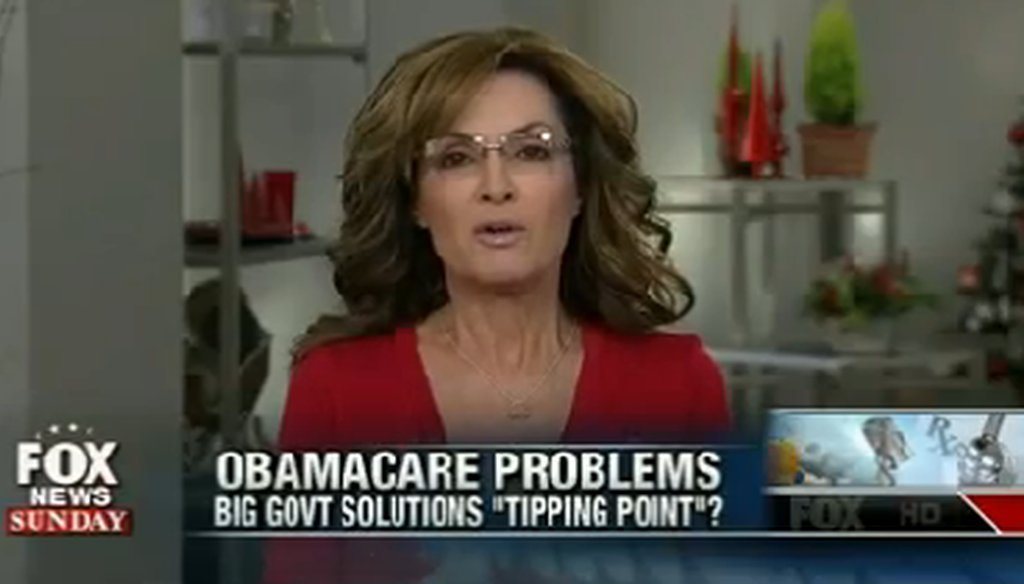

Our only agenda is to publish the truth so you can be an informed participant in democracy.
We need your help.


On "Fox News Sunday," former Alaska Gov. Sarah Palin said: "There will be fewer people being covered under a sensible doctor-patient relationship centered health care program under Obamacare than what we see today."
Any time former Alaska Gov. Sarah Palin weighs in on the health care debate, our ears perk up as fact-checkers. The 2008 vice presidential candidate brought us "death panels" (our 2009 Lie of the Year) and helped circulate the inaccurate statement that the Affordable Care Act is government-run health care.
On Fox News Sunday, Palin continued her criticism of the law and expressed skepticism that "30 million more people will receive health care coverage under Obamacare."
Palin then made a bold statement regarding the health care law and the doctor-patient relationship.
"There will be fewer people being covered under a sensible doctor-patient-relationship-centered health care program under Obamacare than what we see today," she said. "I guarantee you that."
That sounds like other statements PolitiFact has checked in the past. We decided to investigate.
Government, health care and you
We reached out to Palin’s camp in hopes she could clarify her statement, particularly what she meant by a "sensible doctor-patient-relationship-centered health care," but she didn’t get back to us. It sounds like previous claims made by the law's opponents, namely that Obamacare puts the government between Americans and their doctors.
In the past, PolitiFact said that assertion was False. The health care law overwhelmingly relies on the private sector to provide coverage to the millions of Americans currently without health care by offering subsidies to help people obtain private insurance. There is an expansion of Medicaid, but reliance on that joint federal-state program has shrunk as several Republican governors have chosen not to increase their Medicaid rolls. Obamacare primarily sets guidelines for minimum coverage of care and created marketplaces for plans to be bought and sold to the uninsured.
As PolitiFact noted when former Republican presidential candidate Mitt Romney said last year that "Obamacare puts the federal government between you and your doctor," if that were the case, we would expect doctors to be up in arms. Instead, the American Medical Association, the largest doctor advocacy group in the country, has been supportive of the law.
There are other instances when the federal government seeks to improve overall quality of care through bureaucratic means. In 2020, for example, a 15-member panel called called the Independent Payment Advisory Board can recommend changes in reimbursement rates and other cost-saving measures for Medicare. Some have said this will lead to rationing, but we have repeatedly found those concerns exaggerated.
Recent reports
Now, there are recent reports that insurance companies are shrinking their networks, including excluding certain hospitals from coverage. This is particularly the case for insurance plans sold on the new state and federal marketplaces created by Obamacare.
In certain instances, as noted by the Washington Post, it has meant some families forced to change doctors or purchase more expansive, and expensive, plans outside the government-run insurance marketplaces.
The limitations are happening in attempts to keep costs down. One insurance company, Anthem, told the Post "the network still covers 74 percent of all primary-care providers and 78 percent of specialists," and the smaller networks would drive down the cost of their plans.
Some of this maneuvering was going on for years, and a trend already taking place in the industry may have just been accelerated by the law. In the spring of 2011, the Los Angeles Times reported that insurance companies in California offered a narrower list of providers to thousands of customers.
So there is some volatility in the market, and that will continue to be the case as doctors, patients, insurance companies and regulators adjust to changes in the law and the massive amount of new customers now buying insurance.
Our ruling
Palin said the health care law changes "a sensible doctor-patient-relationship-centered health care program."
It's valid to be worried about people potentially seeing changes in their coverage, including some people who will be forced to switch doctors. But that’s a far cry from Palin’s actual words, which suggest some sort of government intervention in the doctor-patient relationship. That's not the case.
We rate Palin’s statement False.
Fox News Sunday, interview with Sarah Palin, Nov. 24, 2013
PolitiFact, "Sarah Palin falsely claims Barack Obama runs a 'death panel,'" Aug. 10, 2009
PolitiFact, "Obama's plan does not call for government-run health care," Oct. 2, 2008
PolitiFact, "Health law puts government in between patients and doctors, Mitt Romney says," July 9, 2012
New York Times, "Lower Health Insurance Premiums to Come at Cost of Fewer Choices," Sept. 22, 2013
Washington Post, "Insurers restricting choice of doctors and hospitals to keep costs down," Nov. 20, 2013
Los Angeles Times, "A shift toward smaller health insurance networks," April 3, 2011
In a world of wild talk and fake news, help us stand up for the facts.
